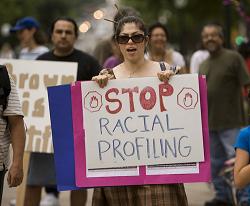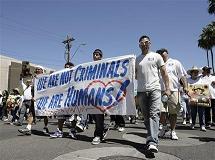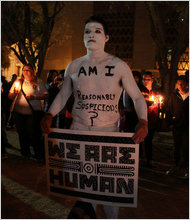PHOENIX Gov. Jan Brewer has removed the state’s attorney general from defending Arizona’s new immigration-enforcement law, accusing him of colluding with the U.S. Justice Department as it weighs whether to challenge the law in court.Brewer, a Republican, said she took action after state Attorney General Terry Goddard, a Democrat and her potential challenger for re-election, met Friday with Justice Department lawyers, who then met with her legal advisers.
Goddard, who has publicly stated he opposes the law but vowed to defend the state in court as its chief lawyer, said he told the Justice Department team “we need solutions from Washington, not more lawsuits.”Brewer expressed similar sentiments after her legal advisers met with the federal lawyers, vowing to defend the state to the U.S. Supreme Court if necessary.
But she accused Goddard of a lack of resolve on immigration matters and called his meeting with the Justice Department team a “curious coordination.”The immigration law she signed gave her the power to coordinate the state’s legal defense because the Legislature saw a “lack of confidence” in Goddard’s willingness to defend the law, she said.
The U.S. attorney general, Eric Holder Jr., is nearing a decision on whether to challenge the law, which gives the state and local police broad authority to enforce federal immigration law. It allows the police to check the immigration status of people they suspect are illegal immigrants whom they have stopped for another reason.Holder has said he worries the law may intrude on federal immigration authority and lead to profiling. On Thursday he met with police chiefs who oppose the law as divisive and a detriment to getting immigrants to report crime and cooperate with criminal investigations.
Meanwhile, thousands from around the country marched to the state capital, Phoenix, on Saturday to protest the new law, set to become effective July 29.Opponents of the law suspended their boycott against Arizona and bused in protesters from around the country.Midtown Phoenix buzzed with protesters carrying signs and American flags. Dozens of police officers were on standby along the route of the five-mile march, and helicopters hovered overhead.
Supporters of the law expected to draw thousands to a rally of their own later Saturday at a baseball stadium in suburban Tempe, encouraging like-minded Americans to “buycott” Arizona by planning vacations in the state.Some opponents of the law have encouraged people to cancel conventions in the state and avoid doing business with Arizona-based companies, hoping the economic pressure forces lawmakers to repeal the law.But Alfredo Gutierrez, chairman of the boycott committee of Hispanic civil-rights group Somos America, said the boycott doesn’t apply to people coming to resist the law. Opponents said they secured warehouse space for people to sleep on cots instead of staying in hotels.
“The point was to be here for this march to show support for these folks, then we’re out,” said Jose Vargas, a union representative for New York City teachers. “We’re not spending a dime here.”Supporters of the law sought to counteract the economic damage of boycotts by bringing supporters into the state.
“Arizona, we feel, is America’s Alamo in the fight against illegal and dangerous entry into the United States,” said Gina Loudon of St. Louis, who is organizing the “buycott.””Our border guards and all of Arizona law enforcement are the undermanned, undergunned, taxed-to-the-limit front-line defenders trying to hold back the invasion,” she said.




